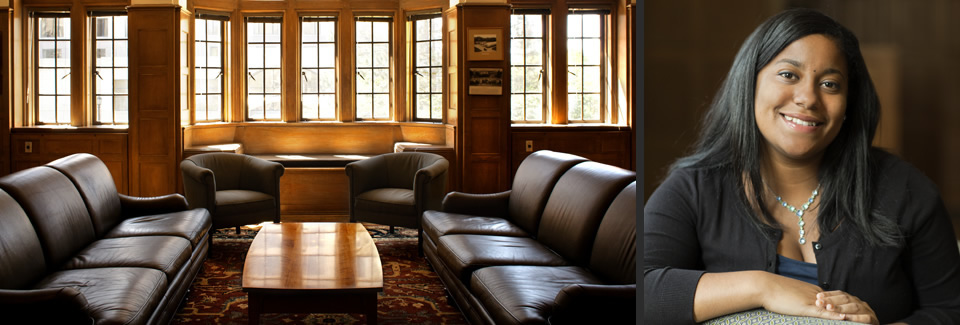
Class of 2012
For Melanie Berdecia ’12, an interest in law grew out of her own childhood rebellion. “My mom always told me,” Berdecia says, “‘you should think about becoming a lawyer because you like to argue and you’re always questioning things.’”
A senior in the School of Industrial and Labor Relations, Berdecia graduates with a concentration in the Department of Labor Relations, Law, and History. She plans to go to law school in the fall.
A former member of the Cornell Forensics Society, Berdecia sees working inside the legal system as a powerful means of reforming society and believes that “if you make good arguments, you can change the way things function.” She has a passion for civil rights advocacy and immigration law reform, aspiring to have the most impact in these areas in the future. “My goal is to become a federal judge. If I can make it to the Supreme Court that would be amazing,” she says.
On the cusp of graduation, Berdecia is looking back at her time at Cornell with nostalgia. In her four years at the university, she garnered many accolades. She is a member of the Quill and Dagger Senior Honor Society and received an ILR grant to travel to the Dominican Republic to conduct research for her honors thesis—an investigation into the ways in which the labor rights of workers in the apparel industry have been affected by the Dominican Republic-Central America-United States Free Trade Agreement (CAFTA-DR). Most recently she was awarded the SUNY Chancellor’s Award for Student Excellence.
Of all her accomplishments, Berdecia is most proud of two: serving for two years as the former co-chair of La Asociacion Latina (the umbrella organization for a majority of Latino organizations on campus), and becoming a teaching assistant for Associate Professor Michael Evan Gold’s Labor and Employment Law class—a responsibility that she met with enthusiasm and energy.
Coming to Cornell, even going to college, was not an obvious path for her. Raised by a single mother who emigrated from the Dominican Republic to New York City, Berdecia and her older brother grew up in Washington Heights and in different neighborhoods of the Bronx.
Her early school experiences were challenging. When Berdecia enrolled at a new middle school, she was often picked on. “I felt like I needed to prove something to the students, to show them that they couldn’t beat me up,” she says. To adapt, she made friends with the bullies. She started hanging out with them, she says, and got into trouble occasionally.
“The teachers started telling me, ‘You’re very smart, but you’re not doing the right thing by putting yourself in these positions where you’re not really taking advantage of how smart you are. You’re just trying to be a rebel,’” she recalls.
So Berdecia took her studies more seriously and paid greater attention in her honors classes. She spent more time reading books and less time hanging out with her friends, much to their dislike.
It was her family’s economic hardships that made her realize the value of higher education. She remembers a time when her family was “roaming from relative’s house to relative’s house,” she says. “I didn’t like to be in that position, where we had to be dependent on other people, and so I wanted to make it so that my family never has to go through something like that again.”
She also recalls the pain of finding her mother, the head of her household, very distraught upon losing a job. “When I got home from high school one afternoon, I found her crying. She was worried and didn’t know what to do. That memory has always driven me to protect my family and to protect my interests. It was important for me to get an education.”
Berdecia was eight years old when her mother graduated from Bronx Community College with an associate’s degree. Berdecia says that watching her mother showed her how education makes a difference in life and taught her to study hard.
After focusing on her studies, Berdecia graduated salutatorian from her high school, and she credits the Arthur O. Eve Higher Education Opportunity Program (HEOP) for playing an important role in her coming to Cornell. “I was given a huge opportunity, and that’s why I’m very grateful for everything that Cornell has done for me. I feel very privileged to be here,” she says.
Berdecia says that she also appreciated the university’s need-based financial aid, as well as the scholarships she received from outside organizations. She was a Congressional Hispanic Caucus Institute-Ford Scholar, an Albert Shanker United Federation of Teachers Scholar, a New York State Lottery Scholar, a SUNY Empire State Minority Scholar, and a New York State Merit Scholar.
Cornell’s diversity also attracted her to the school, she says, and she was excited when she discovered how law was important in many disciplines at the university. When she was considering her major, she read Cornell’s ILR School brochure and was instantly impressed with its multidisciplinary approach.
As she graduates, she hopes future Cornellians will also embrace the diverse student body and their own identities.
“Don’t be afraid of something different and meeting new people because that’s where you learn the most when you are in those kinds of environments,” she says. “Don’t be afraid of yourself and your identity.”







